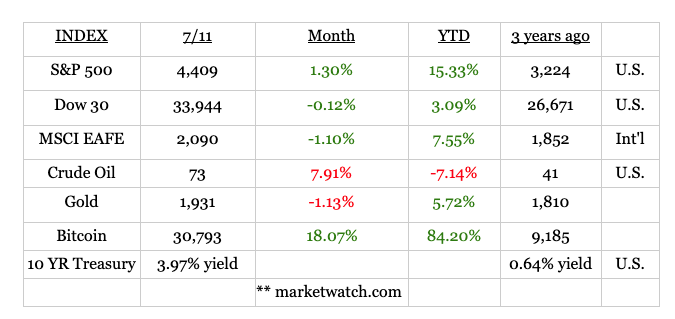finbit$: It won’t always be accurate and it needs improvement.
“It comes with critical limitations: It won’t always be accurate, and it needs improvement.” No this isn’t my wife describing me to her friends, family, and her tens of followers on TikTok. This reflects the meteoric rise and complex issues with generative artificial intelligence. Open AI, Microsoft, Alphabet (aka Google) and many others are racing to put forth their own version of AI. But like me it has limitations and it may be years before it is a useful tool for businesses. Even with AI’s limitations, online courses are popping up to teach employees how to use the new AI tech. If AI is creating online courses to teach AI to humans then isn’t that a conflict of interest from AIs perspective?! If a tree falls in the forest and nobody hears it then…my brain hurts! This AI thing might take a while to understand.
GDP, unemployment rate, housing starts, an inverted yield curve, and inflation rate are all economic indicators of one sort or another. Fascinating, you inquire, tell me more. Economic indicators inform economists, companies, and investors of not only where the economy is today but perhaps where the economy may be headed, according to Investopedia. One economic indicator that may be signaling an oncoming recession: Soft demand for cardboard boxes. Data from the Fibre Box Assn. (I bet they have wild industry conferences) suggest that demand for corrugated linerboard…what most cardboard boxes are made from… has fallen in line with previous recessions. Meanwhile, the American Forest and Paper Assn. (rival assn. known for their rip roaring happy hours) reports that total boxboard production was down 5% in the first quarter, compared with 2022. You would think that weaker cardboard box demand signals weaker demand for goods. But service industries in developed economies like the U.S. remain resilient, which is cushioning the blow from the diminishing demand for physical goods. Many “experts” have forecasted a recession in 2023 or slowdown in 2024. Should that affect your investment plan longterm? Probably not unless you don’t know what you own. You should know what you own and if your asset allocation still fits your long term plans then it is always prudent to not time the short term swings in the market. Stay invested and don’t try to time your exit and entry into the markets and get crushed like a cardboard box!
Hey JB?
HEY JB - TV is horrible these days. Back when I was a kid we had Happy Days, Gilligans Island, and occasionally we could sneak in Three’s Company if my parents weren’t home. Now the only good thing on TV are the car insurance commercials. That darn Flo cracks me up. And Jake from State Farm seems like a cool dude! The Liberty Mutal guy with the Emu is weird, but I’m still entertained. Even though I love the commercials, I can’t stand that my car insurance keeps going up each year. Any suggestions on how I can save some money on car insurance? Signed Fonzi Fan
Dear Fonzi Fan - Yes I miss the golden years of TV, and I could do without all the unrealistic “reality” TV. Buckle up, let’s talk car insurance.
#1 find your current policy online and understand your coverages
Shop comparatively - Get online or find an independent agent.
Consider only high quality insurers - avoid JimBob’s insurance co.
Take advantage of discounts - Bundle renters/homeowners with car
Buy a car that is relatively inexpensive to insure - not a Porsche
Improve your driving record - try not to hit stuff while driving
Raise your deductibles - shifts more costs to you if you have an accident but will lower your premiums
Keep adequate liability insurance - don’t get too cheap and leave yourself exposed
quote bit$
“AI will be the best or worst thing ever for humanity.”
- Elon Musk (pretty smart guy)
marketbit$

